Returning students drive reopening of two residence halls
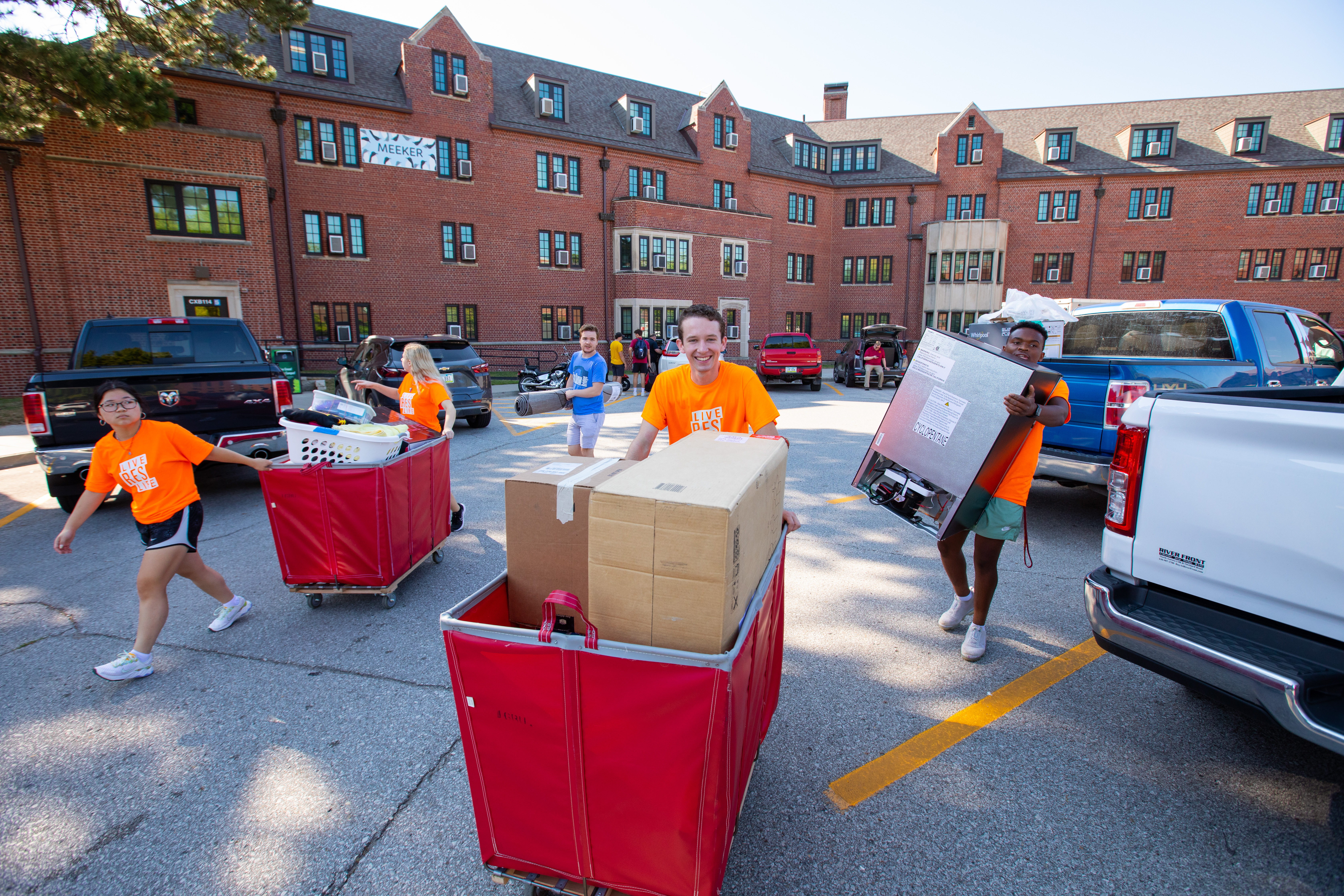
There was lots of hustle and bustle outside Friley Hall on Wednesday as first-year students moved in to campus housing. Nearly 250 orange-shirted student volunteers helped families with that big job. Photo by Christopher Gannon.
With the fall semester set to begin Monday, it's move-in week on campus. About 400 full-time and student staff for the department of residence, along with nearly 250 student volunteers, have been working to ensure the smoothest transition possible -- answering questions, preparing spaces, and helping educate and guide new students as they settle in.
It's a bit of a bigger job than in recent years, as more than 9,600 students have signed up to live on campus as of Aug. 11 -- the most since 2019, said Meredith Ponder Hanisch, communications and marketing director for campus life.
To meet that demand, two residence halls that were closed in recent years, Wallace and Linden, are reopened for student housing. Linden Hall served as COVID-19 isolation housing during the pandemic, while Wallace was closed last year to adjust to a fluctuating student population.
As it has at times in the past, Wallace is reserved for single-occupancy contracts. While the Storms Dining Center at the Towers complex remains closed, ISU Dining is opening a new mini-mart this fall in Wallace, using it ISU vending contract with Pepsi. In Linden Hall, newly added communal kitchens are available for students to use, including stoves, microwaves and large sinks.
The other Towers building, Wilson Hall, remains closed for a second year, but residence department leaders expect it to be needed for student housing again next year if trends continue, Ponder Hanisch said. Oak-Elm was set to close for 2020-21, a decision made shortly before the COVID-19 pandemic, but was used as quarantine housing two years ago before reopening for regular operations in 2021-22.
Here's a look at the recent trends in residence system occupancy, based on fall numbers:
|
Year |
Residence hall occupancy |
Apartment occupancy |
Total residents |
|
2022* |
96.8% (6,607) |
85.3% (3,050) |
9,657 |
|
2021 |
96% (5,903) |
89.1% (2,916) |
8,819 |
|
2020 |
85.2% (5,817) |
75.8% (2,841) |
8,658 |
|
2019 |
94% (6,967) |
93.6% (3,490) |
10,457 |
*As of Aug. 11
Everyone has a role in growing public health effort
Questions?
Faculty and staff who have questions about public health can contact university public health coordinator Dr. Kristen Clark and the public health team at publichealthteam@iastate.edu.
Supporting the well-being of students and employees is a critical university priority that has led to increased investment in resources, programming and staff devoted to fostering health. That growing focus at ISU, like all public health work, depends on personal decisions and efforts.
"We all play a part on campus when it comes to promoting health," said Erin Baldwin, associate vice president for student health and wellness and director of the Thielen Student Health Center. "It's important to be aware and understand what we need to do as individuals."
Baldwin recently spoke with Inside about what faculty, staff and students should know about the university's public health focus in the coming year. Here are some of the highlights:
Listening and helping
Supporting mental health concerns and connecting students -- and colleagues -- with assistance they need is key to creating a culture of well-being at Iowa State, Baldwin said. Faculty and staff have many ways to learn about how to help, including a new toolkit for supporting student well-being and a variety of training options that includes two new programs launched earlier this year -- recovery ally training and Cyclone Support, a session on practical tools and practices.
Many of the same strategies for supporting students apply to employees concerned about friends, family, co-workers or their own well-being, Baldwin said.
"You don't have to be a mental health counselor," she said. "It's about listening with empathy and connecting people with resources."
Student Wellness maintains a list of well-being resources for students. ISU WellBeing is a good resource for employees looking for resources, including available mental health services.
COVID-19 changes
With immunity levels bolstered by vaccines and prior infections and antiviral treatments available for those at greatest risk, the chance of severe outcomes from contracting COVID-19 are reduced for most people, and the university's less prescriptive approach to COVID-19 this year reflects that, Baldwin said.
"We learn more about COVID-19 each day, and we're thankful for the many new advancements and tools available," she said.
A new ISU COVID-19 website launched in May and includes information on vaccines, testing and isolation guidelines, including procedures for students who test positive and the latest Centers for Disease Control and Prevention (CDC) recommendations.
Employees and students with COVID-19 symptoms should stay home. Faculty and staff who test positive should review the most current isolation guidance and consult with their supervisor, Baldwin said. In a memo to instructors last week, the provost's office provided guidance on classroom public health measures, including a required syllabus statement.
As announced in May, the university no longer publicizes weekly testing data. Positive tests of students at Thielen Student Health Center are reported to the Iowa Department of Public Health and count toward Story County data in the state's weekly report.
Staying aware
The university will continue to distribute free masks and at-home COVID-19 antigen tests at four campus locations during the fall semester: Thielen, the Memorial Union information desk, the Union Drive Community Center mailroom and 2270 Veterinary Medicine.
While it is a personal decision, ISU's public health team recommends following the CDC guidance that calls for wearing a mask around others indoors when the COVID-19 community level is high, Baldwin said. Community levels can be found online and are updated weekly. As of Aug. 18, Story County's community level is medium.
The public health team also urges students and employees to stay up-to-date on their vaccines, both for COVID-19 and later this fall for influenza, Baldwin said. An update to the COVID-19 vaccine also may be available sometime this fall, she said. COVID-19 vaccines are widely available from local health providers and pharmacies, and students can be vaccinated at Thielen. The annual employee flu shot clinic will be held later this fall.
"It's so important to stay up-to-date on vaccinations to add that layer of protection against significant illness," she said.
Baldwin said she hopes living through a pandemic will make effective prevention practices such as frequent hand-washing and masking more prominent during the height of flu season.
"When we all really focused on masks and hand-washing, many people reported having less illness. Flu season is a really good time to focus on washing your hands and could be a time to consider wearing a mask," she said.
What about monkeypox?
Monkeypox is a rare disease caused by a virus in the same family of viruses as the virus that causes smallpox. Its symptoms are similar to smallpox, but milder and rarely fatal, including a rash, fever, chills, swollen lymph nodes, exhaustion, muscle aches, headache and respiratory issues.
As of Aug. 15, nearly 12,000 cases of probable or confirmed monkeypox have been detected in the U.S., and the CDC and World Health Organization have both declared it a public health emergency. Monkeypox does not spread easily between people but can be transmitted by close, skin-to-skin contact with a person who has a rash or scabs, saliva, or objects or surfaces used by someone with monkeypox.
The best way to protect yourself from monkeypox is to avoid skin-to-skin contact with anyone who has a rash that looks like monkeypox, Baldwin said. See a health care provider if you have a new or unexplained rash or other symptoms of monkeypox.
For more information, see the CDC's monkeypox website or this fact sheet for teens and young adults.
Global outlook
Tracking infectious diseases takes an international outlook at Iowa State, a global community with students, faculty and staff frequently abroad, Baldwin said.
"We must have continuous situational awareness of what is happening across the world to help inform the campus community and proactively plan to support the holistic well-being of all," Baldwin said.
That's part of the reason Iowa State's created a university public health coordinator position, appointing Dr. Kristen Clark to the position late last year. Formerly a lead public health veterinarian for ISU's Center for Food Security and Public Health, Clark served as the university's COVID-19 public health coordinator.
Under a policy established shortly before the COVID-19 pandemic, all university-affiliated international travel must be registered with the risk management office to ensure proper preparation, including assessment of health protocols.
Before traveling domestically or abroad, it's important to review public health recommendations and requirements for the destination and stops along the way, and travelers should consider bringing masks, home COVID-19 testing kits and hand sanitizer, Baldwin said.
Public health situations and recommendations constantly change, but the public health team closely monitors these situations on a global scale. To ensure you stay informed on the most current public health information, guidance and recommendations to protect yourself and members of our Cyclone community, please bookmark and regularly visit the ISU public health website.
University restructures online education programs under CELT umbrella
Iowa State announced a plan this month to restructure its online education staff from academic colleges into a single new unit -- Iowa State Online -- which will become part of the Center for Excellence in Learning and Teaching (CELT).
According to provost Jonathan Wickert, expanding Iowa State's online education programs is an institutional priority consistent with the university's and state Board of Regents' new strategic plans. The unit received $600,000 in "jump start" funding from President Wendy Wintersteen to support its planned Jan. 1, 2023, launch.
"Iowa State Online will be a seamless integrated unit for course design and delivery, new program and market development, and a consistent brand for our online programs," Wickert said. "This is an exciting opportunity to bring together all our faculty and staff, across all disciplines and modalities, to best serve students and instructors, and align our efforts with the best practices of other institutions."
The creation of Iowa State Online also is responsive to two recent review efforts: the Online Learning Strategy Task Force, which completed a thorough analysis of the university's online learning environment; and the regents' Distance Education Task Force.
Restructuring details
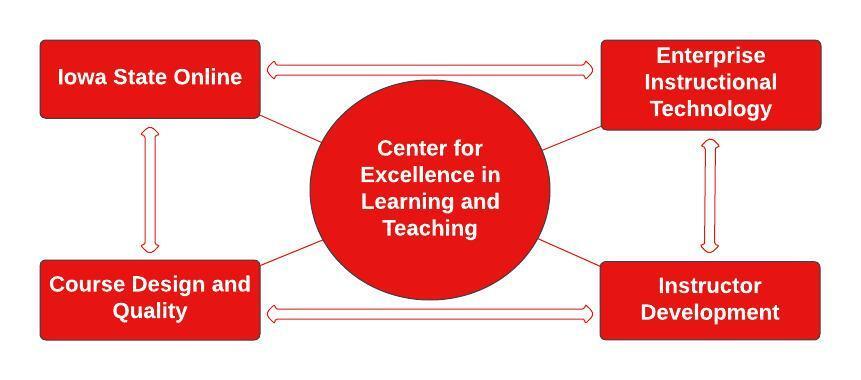
Expanding CELT to encompass online programs creates four pedagogical focuses:
- Iowa State Online, including marketing, new programs, corporate outreach, business development and student success functions.
- Instructor development, including core support for instructors, training for faculty and graduate students, faculty fellows, and the inclusive classroom program.
- Course design and quality, including instructional design, quality and faculty support.
- Enterprise instructional technology, including media production, Canvas administration and learning tools integration, and the online testing centers.
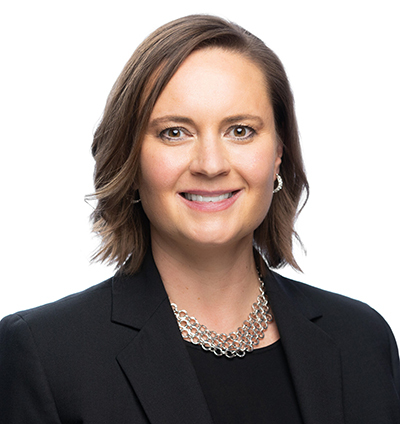
Sara Marcketti
CELT's mission will be strengthened with the addition of distance and online support staff currently serving in academic departments or colleges. CELT director Sara Marcketti will continue to lead the unit with a title change to become assistant provost and executive director of CELT. Susan Arendt, who currently serves as provost's faculty fellow for online education, will serve as the inaugural director of Iowa State Online.
The combined unit, including CELT staff currently housed in Morrill Hall, will relocate to Howe Hall later in the fall semester and during winter break.
Preparing for the future in online education
Ann Marie VanDerZanden, associate provost for academic programs and architect of the restructuring effort, notes the creation of Iowa State Online will enable the university to pursue emerging opportunities in online education.
"We are focused on the entire range of programs, from undergraduate and graduate degree programs to certificates and stackable 'micro-credentials' that help working professionals develop additional skills and grow their careers, to services for adult learners and degree completion programs," she said.
VanDerZanden, who represents Iowa State on the Iowa Business Council's Business Education Alliance, also sees a future for customizable programs that leverage faculty expertise to address the specific needs of Iowa employers.
Next steps
The office of the senior vice president and provost has been working with university human resources and an Iowa State Online implementation team over the last several months to update position descriptions and job profiles, including creating several new manager and supervisor positions.
Additional elements in the timeline are:
- August: Individual meetings with staff, posting of all positions, interviewing for manager positions.
- September: Interviews for supervisor and other positions.
- October: Training for new roles/employees, determining staff plan and support for Winter Session.
- November: Current CELT staff move from Morrill Hall to Howe Hall.
- December: Staff currently serving in college units assist faculty with end-of-semester issues and finalize courses/projects for spring semester; all other staff move to Howe Hall during winter break.
Welcome
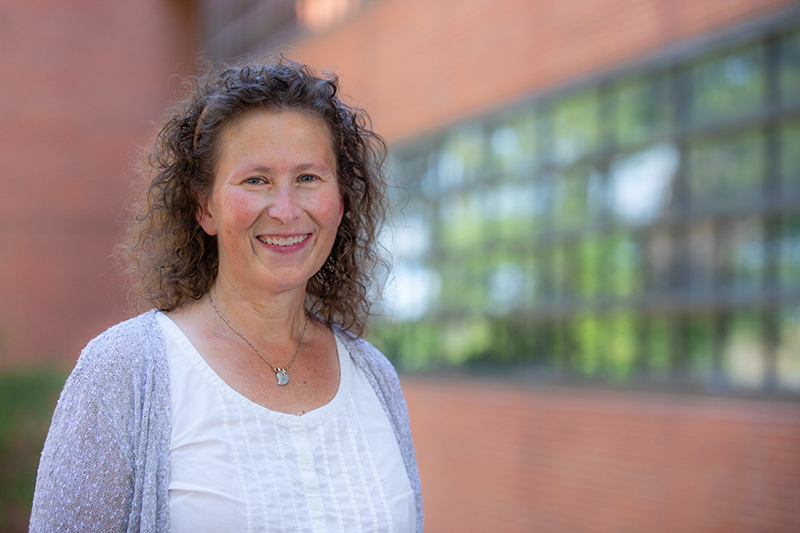
Since Aug. 1, university ombuds Laura Smythe has been working out of the new ombuds office in the west wing of Agronomy Hall. Photo by Christopher Gannon.
Laura Smythe ("Sm-eye-th") became the university ombuds on April 18, and after working remotely for three months, arrived on campus Aug. 1. Iowa State's free ombuds service offers impartial, confidential help to faculty, staff, postdocs and graduate and professional students who want to resolve university-related problems.
Smythe also offers training on more than a dozen topics such as using language to de-escalate, facilitating difficult conversations, leading an inclusive meeting or recognizing workplace bullying.
Smythe comes to Iowa State from the University of Idaho, where she served as university ombuds for all five of its campuses (2018-22). Previously, she oversaw pro bono programming for law students at the University of Wisconsin, Madison (2014-18), and served as executive director of the Mediation Center of Greater Green Bay (2011-15). Since 2003, she has operated her own firm, consulting in organizational culture and conflict resolution and serving as a contract ombuds. Since 2013, she also has provided training in mediation and communication skills for staff in the state of Wisconsin's Department of Health Services.
She earned a bachelor's degree in Spanish from the College of Wooster, Ohio; and two master's degrees (political science, Latin American and Iberian studies) and a law degree from the University of Wisconsin, Madison.
Smythe's hire brought the ombuds service in house again. From August 2020 to last spring, the service was offered virtually, with two Boston-based ombuds assisting Iowa State employees.
The ombuds service is in suite 2101A-C in the west wing of Agronomy Hall. Due to the confidential nature of the work, the ombuds office doesn't offer walk-in service. To schedule an appointment, call 515-450-7186 or email lsmythe@iastate.edu.
No need to cram. Instructors have time to pass New Quizzes
Most instructors had their first opportunity this summer to use New Quizzes since it became available campuswide June 1. Instructors also had the option to respond to a Center for Excellence in Learning and Teaching (CELT) survey on their experiences with the new quiz engine in Canvas.
About 80% of the 52 instructors who responded did not make the switch, while 15% did use it in a summer course. The remaining 5% did not use New Quizzes in a summer course but began testing it in a shell course – a sandbox -- available to all instructors.
Quiz training
CELT will host online trainings Aug. 31 (building a New Quiz) and Sept. 1 (settings and accommodations) about New Quizzes. Trainings will take place from 2-3 p.m. and 2-2:50, respectively. Canvas-led trainings will take place Sept. 6 (1-2 p.m.) and Sept. 7 (10 a.m.-noon). They are open to the first 55 people who register for each training. They will be recorded and made available."Based on the Canvas timeline, we have two years to transition to New Quizzes," said Angi Beau-Karthik, CELT instructional technology specialist. "What we would like to see is people exploring the new quiz engine in their sandbox courses."
Beau-Karthik said summer instructors recommended their colleagues allow enough time to become familiar with new features of New Quizzes to test question types in their sandbox courses.
New Quizzes offers a modern interface, mobile-friendly design, new question types (such as hot spot, stimulus, categorization and ordering questions), print-out capacity and options for student accommodations.
Multiyear transition
The transition between quiz engines is a multiyear process where instructors no longer will be able to create new Classic Quizzes in June 2023, but can continue to edit and administer existing Classic Quizzes until it sunsets on June 30, 2024. The content of existing Classic Quizzes can be migrated to New Quizzes after 2024.
The switch to a new quiz engine is required by Canvas, which dictates the pace of migration. Moving information from one quiz type to the other is not seamless at this point, at least for now. CELT staff recommend transitioning slowly and only with uncomplicated quizzes that do not contain question groups or question banks. If an instructor is designing new, uncomplicated quizzes it can be a timesaver to build in New Quizzes.
"It is our hope that by June 2023 the migration tool is streamlined to make for a seamless transition to New Quizzes," Beau-Karthik said.
Training
CELT is offering virtual trainings Aug. 31 and Sept. 1 and two Canvas-led trainings are Sept. 6-7. Instructors can choose which sessions they would like to attend.
Beau-Karthik will lead the Aug. 31 training from 2-3 p.m., focusing on building a New Quiz.
"I focus on building all the new question types, discuss and demo item banks, and how to use them for question randomization," she said.
Instructional design specialist Lori Mickle will discuss settings and accommodations on Sept. 1 from 2-2:50 p.m. She will demonstrate how to implement accommodations for students and the use of a LockDown Browser – to control the environment during testing or quizzes – in New Quizzes. While the test centers will offer proctoring for New Quizzes, Mickle suggests instructors reach out ahead of time to ensure students have a smooth quiz-taking experience.
The Canvas-led offerings will focus on an overview and advance features of New Quizzes. Both sessions are online and available to the first 55 people who sign up for each. The sessions will be recorded and available to everyone.
CELT has a New Quizzes webpage with links to other resources and information for instructors that is continually updated.
Improving retention and WorkFlex among P&S Council's goals
The Professional and Scientific Council's big-picture goals for 2022-23 will focus on employee retention, flexible work program improvements and educating constituents, under the strategic initiatives proposed at the council’s Aug. 4 meeting.
The council sets strategic initiatives annually, a list of priorities that often are long-term issues. While many of the goals are unlikely to be addressed in one year, the aim is to have ideas that can shape the council’s work. The first reading of a motion approving this year's strategic initiatives outlined the priorities proposed by council leaders, based on members’ suggestions at the July meeting and input from P&S staff.
The initiatives include suggesting ways to make WorkFlex more robust and equitable and educating P&S staff on how to better understand the university so they can become more engaged and thrive on campus.
A goal to boost P&S staff retention listed several issues for the council to support:
- A revised budget model that ensures recurring and competitive performance-based salary increases, while retaining existing benefits and leave policies
- Additional supervisor training on inclusive work environments, employee evaluations, conflict resolution, hiring, onboarding and promotions
- Compensation that's more standardized across units
- Expanded employee well-being and engagement efforts
The council will vote to approve the initiatives at its September meeting.
More survey results
Peer advocacy committee chair Jacob Larsen presented a report on the responses to open-ended questions posed in the council’s April survey about WorkFlex.
Quantitative results shared with the council in May showed that 90% of the 795 respondents supported WorkFlex, and 71% were satisfied with the options available under the program, which allows flexible scheduling and up to three days of remote work per week, when it fits with an employee’s job duties. But the survey also asked three qualitative questions:
- How satisfied are you with the amount of work from home time you will get?
- If you could change one thing about the WorkFlex program, what would it be?
- Do you have any other opinions about the WorkFlex program that you’d like to share with the P&S Council?
An analysis of responses to those questions showed some themes, Larsen said. More than one-third said they would like to work from home more often. Other common responses mentioned increasing flexibility, giving supervisors more decision-making discretion and reducing variances in how WorkFlex is implemented in different units.
Council president Jamie Sass said the survey results will help inform a motion recommending some changes to the WorkFlex program that the council will consider this fall.
Revising reimbursement
The council approved a motion asking senior leaders to reinstate a prior policy that allowed eligible staff to be reimbursed for up to four credits of undergraduate or graduate tuition per semester from any accredited college or university. Tuition reimbursement was restricted to ISU courses as part of a slate of budget-cutting measures in 2020.
CyMail is retiring next month
With the migration of 20,000-plus university Gmail accounts to Microsoft Outlook in June, Iowa State took another big step toward a single system for campus email and calendar functions. Most of those Gmail accounts belonged to students who recently graduated or hadn't yet set up their own accounts in Outlook. A small portion belonged to employees, most frequently those who became ISU employees following their graduation and kept using their student email accounts.
Since April 2021, new Iowa State students have received Outlook mail accounts -- and returning students could start using their Outlook accounts, too.
Email addresses and net IDs don't change in the move to Outlook.
One email system = fewer problems
Amy Ward, who manages the identity services team in Information Technology Services (ITS), said more than half of returning ISU students grabbed the opportunity to move to Outlook ahead of the June migration. A key motivator, she said, was access to the same calendar system faculty use. And she credited faculty with doing a great job alerting students to the opportunity to switch.
A single email and calendar system for all members of the university community:
- Lets everyone -- students and employees -- communicate and schedule electronically with ease
- Eliminates hiccups inherent when two systems aren't compatible and don't work well together
- Demands less oversight and trouble shooting by ITS staff, freeing up time for them to work on other projects
Learn more
Articles on using Outlook email
Outlook was the application that made sense because Iowa State has a contract with Microsoft, faculty and staff were already using it, and Google imposed storage quotas on its clients, Ward said. Most businesses use Outlook, so it will benefit students to become familiar with it during their college years.
Read-only through September
Gmail messages and calendar content will be available -- for reading only -- through Sept. 30, when ITS teams will begin removing all the content, Ward said. Gmail content is part of the Google storage Iowa State seeks to lighten as digital storage providers move away from generous capacities for their higher education clients.
Review your calendar settings
With all employees and students now on Outlook, Ward said faculty and staff may want to confirm or modify their calendar settings. They decide how much to share their Outlook calendar, from nothing to details about why you're busy and not available to meet. An in-between option could indicate simply that you're busy during that time. A knowledge base article in the IT portal will help you review your settings.
Your help, please
Ward estimates there are thousands of references to "CyMail" on university websites that need to be changed to Microsoft Outlook or just Outlook. Website administrators are asked to use the Siteimprove digital tool to find and replace CyMail mentions on the sites they manage.
Questions or assistance with Outlook or the campus email project can be directed to the IT Solution Center.
A recap of summer on campus
The fall semester begins Aug. 22. If you were away from campus this summer, here's a quick summary of what you missed:
News
- The state Board of Regents approved 3.1% salary increases for all eligible employees whose performance meets expectations. The increase took effect July 1.
- Phase 2 of the P&S classification and compensation review moved more than 170 employees to a new pay grade.
- Regents approved a 4.25% tuition increase for the 2022-23 academic year.
- Tuition increase bolsters FY23 operating budget.
- Nine projects will jump-start the next strategic plan.
- A new ISU website and employee portal launched.
- New benefit provides financial help to ISU employees who adopt a child.
- ISU faculty, staff and postdocs have access to a personal loan to help with unexpected financial situations.
- Iowa State attracted a record $601.7 million in total external funding for the 2022 fiscal year. It's the first time Iowa State's external funding total has exceeded $600 million.
- One of ISU's iconic swans died in June.
- Summer enrollment topped 8,400, down about 7% from a year ago.
- ISU received approval for its 30-year strategic facilities plan from the state Board of Regents.
- Senior vice president for operations and finance Pam Cain will retire in September.
- Vice president of ISU Extension and Outreach John Lawrence will retire next spring.
- Executive director of student financial aid Roberta Johnson will retire next summer.
Appointments
College leadership
- Bill Graves, reappointed to a second five-year term as Graduate College dean
- Scott Johnson, to associate dean for research and academic personnel in the Ivy College of Business
- Dr. Paul Plummer, to associate dean of research and graduate studies in the College of Veterinary Medicine
- Dr. Jessica Ward, to assistant dean of academic and student affairs in the College of Veterinary Medicine
Directors
- Eileen Canafax, to director of the Child Development Laboratory School
- Susan Harper, to director of the Center for LGBTQIA+ Student Success
- Haley Moon, to assistant director of federal relations
- Chad Olson, to director of student financial aid operations
- Paul Richmond, to assistant vice president for environmental health and safety
- Matthew Sivils, to director of the Center for Excellence in Arts and Humanities for a three-year term
- Carl Wells, to director of equal opportunity and Title IX coordinator
Department chairs
- Leana Bouffard, reappointed to a second five-year term as chair of the sociology and criminal justice department
- Paul Bruski, to chair of the graphic design department
- Sarah Francis, to the Jane Armstrong Endowed Chair of Food Science and Human Nutrition
- Mark Hargrove, to a five-year term as chair of the Roy J. Carver department of biochemistry, biophysics and molecular biology
- Caroline Hayes, reappointed to a third five-year term as chair of the mechanical engineering department
- William Jenks, reappointed to a two-year term as chair of chemistry department
- Lorraine Lanningham-Foster, to chair of the department of food science and human nutrition
- Jason Ross, to chair of animal science department
- Kevin Scheibe, reappointed as chair of information systems and business analytics
- Deidra Schleicher, reappointed as chair of management and entrepreneurship
- Alex Tuckness, to chair of political science department
- Eric Weber, to a five-year term as chair of mathematics
Program leaders
- Steve Kohtz, to recycling and special events coordinator
Interim leadership
- Michael Bailey, to interim chair of the department of world languages and cultures
- Lynn Clark, reappointed to a two-year term as interim chair of the ecology, evolution and organismal biology
- Ana Luz, to interim director of innovation programming at Student Innovation Center
- Heather Paris, to interim senior vice president for operations and finance, effective Sept. 7
- Dr. Chris Rademacher, to interim director of the Iowa Pork Industry Center
- Sharon Wohl, to interim associate dean for faculty in the College of Design
Iowa Staters at the state fair
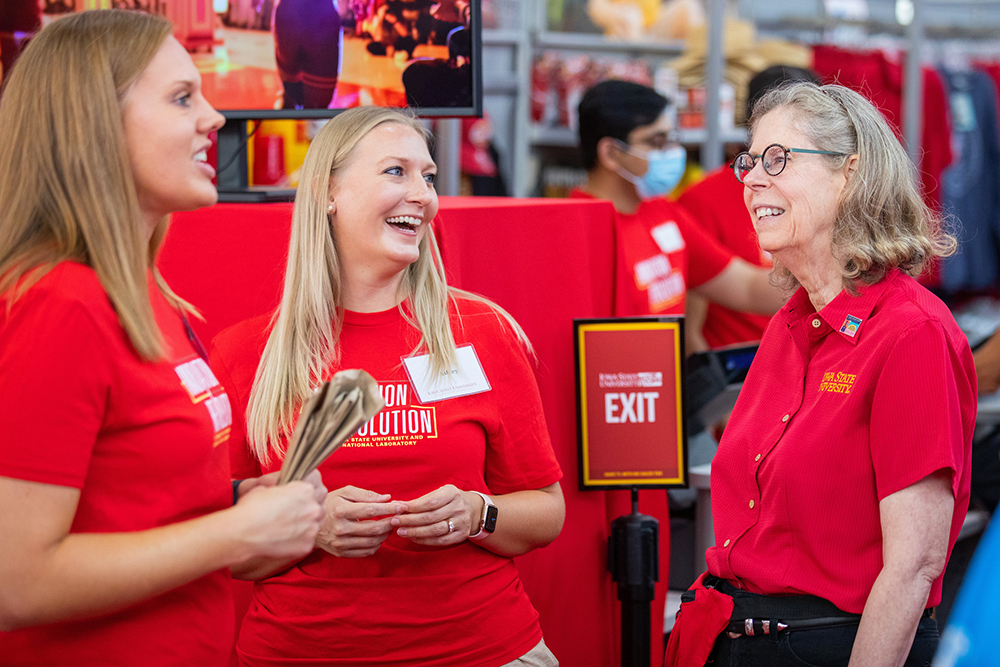
During her Iowa State Fair visit Aug. 12, President Wendy Wintersteen stopped at many ISU-sponsored exhibits, including the university's main exhibit in the Varied Industries Building. Here, she visits with alumni volunteers Maggy Weis and Ashley Moore, who were handing out schedule posters from the athletics department. The fair runs through Sunday; hours at the Varied Industries Building are 9 a.m.-8 p.m. Photo by Christopher Gannon.
